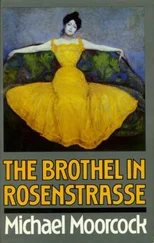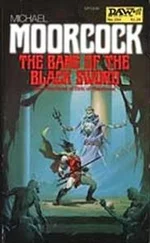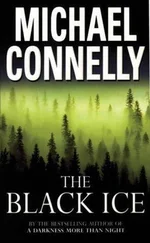Michael Moorcock - The Black Corridor
Здесь есть возможность читать онлайн «Michael Moorcock - The Black Corridor» весь текст электронной книги совершенно бесплатно (целиком полную версию без сокращений). В некоторых случаях можно слушать аудио, скачать через торрент в формате fb2 и присутствует краткое содержание. Жанр: Фантастика и фэнтези, на английском языке. Описание произведения, (предисловие) а так же отзывы посетителей доступны на портале библиотеки ЛибКат.
- Название:The Black Corridor
- Автор:
- Жанр:
- Год:неизвестен
- ISBN:нет данных
- Рейтинг книги:3 / 5. Голосов: 1
-
Избранное:Добавить в избранное
- Отзывы:
-
Ваша оценка:
- 60
- 1
- 2
- 3
- 4
- 5
The Black Corridor: краткое содержание, описание и аннотация
Предлагаем к чтению аннотацию, описание, краткое содержание или предисловие (зависит от того, что написал сам автор книги «The Black Corridor»). Если вы не нашли необходимую информацию о книге — напишите в комментариях, мы постараемся отыскать её.
The Black Corridor — читать онлайн бесплатно полную книгу (весь текст) целиком
Ниже представлен текст книги, разбитый по страницам. Система сохранения места последней прочитанной страницы, позволяет с удобством читать онлайн бесплатно книгу «The Black Corridor», без необходимости каждый раз заново искать на чём Вы остановились. Поставьте закладку, и сможете в любой момент перейти на страницу, на которой закончили чтение.
Интервал:
Закладка:
He cannot see the planet that he and his companions are bound for. He has been in space for three years. He will be in space for another two years. And he cannot see his destination yet. He has only the word of the space physicists that it exists and that it can support the thirteen lives he carries with him. A planet of Barnard's Star, Munich 15040.
He is alone in space, in charge of his ship and the lives of the other twelve. He is more than halfway to his destination.
The sudden remembrance of what he has done sweeps over him. Along with his fear, with the torment caused by the solitude, Ryan feels pride. He causes the cover to sweep down over the 'porthole'. He leaves his room and walks into the control room to continue his duties.
But he cannot get rid of the lingering feeling of depression, the sense of something not done.
This sense of a task unfulfilled makes him work with even greater intensity, even greater efficiency.
He frowns.
There is still something left undone.
He rechecks everything. He runs tests through the computer.
He inspects every instrument and double-checks it to make sure it is reading accurately.
Everything is perfect.
He has forgotten nothing.
The feeling almost disappears.
CHAPTER SEVEN
When he has read his report into the machine Ryan goes to the desk beneath the screen and opens the drawer where his red log-book is lying ready for his remarks.
First he sits down at his desk and hums a song as he completes some calculations. He works quickly and mechanically to complete his task. He lays it aside, satisfied.
He has fifteen minutes free now. He produces the red log-book from the drawer again, rules a line under his formal report and writes: Alone in the craft I experience the heights and depths of emotion untempered by the needs of less mechanical work than I do now, uninterrupted by the presence of others.
He reads this over, frowns, shrugs, continues: This means deep pain and being a prey to my own feelings. It also means great joy. An hour ago I stared out of my porthole at the enormous vista and recollected what I—what we as a group— have done to save ourselves. My mind goes back to how we were, and forward to what we will be.
Ryan's stylus hovers over the page. He makes writing motions over the book, but he cannot phrase his thoughts.
At length he gives up, rules another line under his entry, shuts the book and replaces it in the drawer.
He changes his mind, gets the book out again and begins to write rapidly: The world was sick and even our group was tinged with unhealthiness. We were not lilywhite. We sold out some of our ideals. But perhaps the difference was that we knew we were selling out. We admitted what we were doing and so remained rational when almost everyone else had gone insane.
It is true, too, that we became somewhat hardened to the horrors around us, shut them out—even condoned some of them—even fell in with the herd from time to time. But we had our objectives— our sense of purpose. It kept us going. However, I don't deny that we dirtied our hands sometimes. I don't deny that I got carried away sometimes and did things that I now am inclined to regret.
But perhaps it was worth it. After all, we survived!
Perhaps that is all the justification needed.
We kept our heads and we are now on our way to colonise a new planet. Start a new society on cleaner, more decent, more rational lines.
Cynics might think that an impossible ideal. It will all get just as bad in time, they'd say. Well, maybe it won't. Maybe this time we really can build a sane society!
None of us is perfect. Especially this crew! We all have our rows and we all have qualities that the others find annoying. But the point is that we are a family. Being a family, we can have our arguments, our strong disagreements—even our hatreds, to a degree— and still survive.
That is our strength.
Ryan yawns and checks the time. He still has a few minutes free time to spare. He looks at the paper and begins to write again: When I look back to our days on Earth, particularly towards the end, I realise just how tense we were. The ship routine has relaxed me, allowed me to realise just what I had become. I don't like what I became. Perhaps one has to become a wolf, however, to fight wolves. It will never happen again. There were times, I cannot deny, when I lost hold of my ideals—even my senses. Some of the events are hazy—some are almost completely forgotten (though doubtless one of my relatives or friends will be able to remind me). I can hardly believe that it took such a short time for society to collapse.
That was what caused the trauma, of course—the suddenness of it all. Obviously, there were signs of the coming crises, and perhaps I should have taken more heed of those signs—but then all chaos suddenly broke loose throughout the world! What we tut-tutted at in the manner of older people slightly disconcerted by the changing times I now realise were much more serious indications of social unrest. Sudden increases in population, decreases in food production —they were the old problems that the Jeremiah had been going on about for years—but they were suddenly with us. Perhaps we had been deliberately refusing to face the problem, just as people had refused to consider the possibility of war with Germany in the late thirties. We homo sapiens have a great capacity for burying our heads in the sand while pretending to face out the issues.
Ryan smiles grimly. It's true, he thinks. People under stress usually start dealing with half a dozen surrogate issues, leaving the real issues completely untouched because they're too difficult to cope with. Like the man who lost the sixpence in the house but decided to look for it outside because the light was better and he would thus save his candles.
He adds in his log: And there's always some bloody messiah to answer their needs— someone whom they will follow blindly because they are too fearful to rely on their own good sense. It's like Don Quixote leading the Gadarene Swine!
Ryan chuckles aloud.
Leaders, fuhrers, duces, prophets, visionaries, gurus... For a hundred years the world was ruled by bad poets. A good politician is only something of a visionary-essentially he must be a man who sees the needs of people in practical and immediate terms and tries to do something about it. Visionaries are fine for inspiring people— but they are the worst choice as leaders—they attempt to impose their rather simple visions on an extremely complicated world! Why have politics and art become so mixed up together in the last hundred years? Why have bad artists been given nations as canvases on which to paint their tatty, sketchy, rubbish? Perhaps because politics, like religion before it, was dead as an effective force and something new had to be found. And art stood in until whatever it was turned up.
Will something turn up? It's hard to say. We'll probably never know on Munich 15040 if the world survives or not.
Thank God we had the initiative to get this ship on her way to the stars!
No more time for writing. Ryan puts the log-book away quickly and begins his regular check of the ship's nuclear drive, running a check on virtually every separate component.
He taught himself the procedure for running the ship. He was not trained as an astronaut. No one planned that he should be the man standing in the control cabin at that particular moment.
Until comparatively recently Ryan was, in fact, a business man.
A pretty successful business man.
As he does the routine checking, he thinks about himself before he even conceived the idea of travelling into space.
He sees himself, a strongly built man of forty, standing with his back to the vast plate glass window of his large, thickly carpeted office. His heavy, healthy face was pugnacious, his back was broad, his thick, stubby-fingered hands were clasped behind his back.
Читать дальшеИнтервал:
Закладка:
Похожие книги на «The Black Corridor»
Представляем Вашему вниманию похожие книги на «The Black Corridor» списком для выбора. Мы отобрали схожую по названию и смыслу литературу в надежде предоставить читателям больше вариантов отыскать новые, интересные, ещё непрочитанные произведения.
Обсуждение, отзывы о книге «The Black Corridor» и просто собственные мнения читателей. Оставьте ваши комментарии, напишите, что Вы думаете о произведении, его смысле или главных героях. Укажите что конкретно понравилось, а что нет, и почему Вы так считаете.









